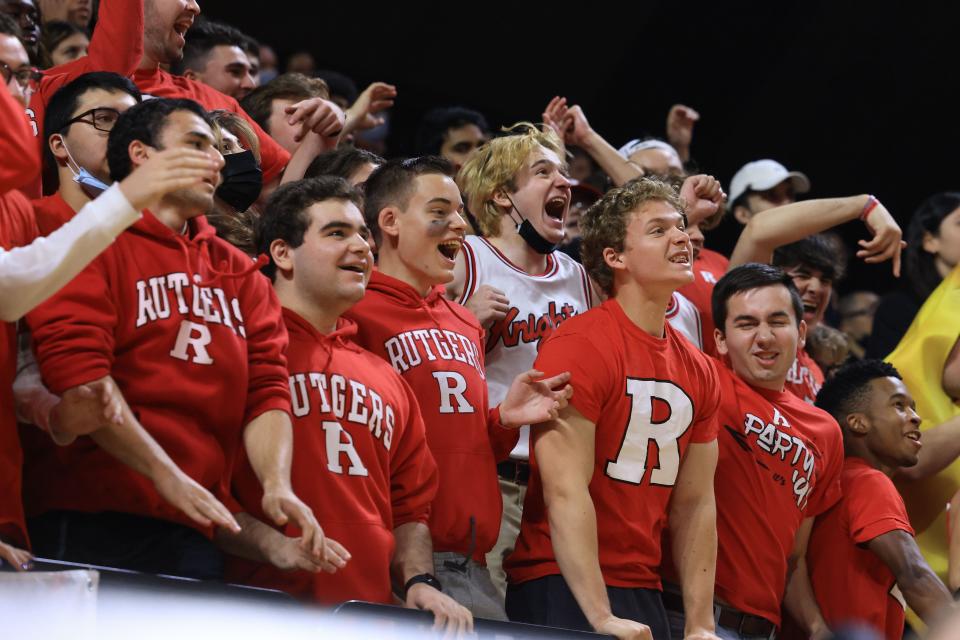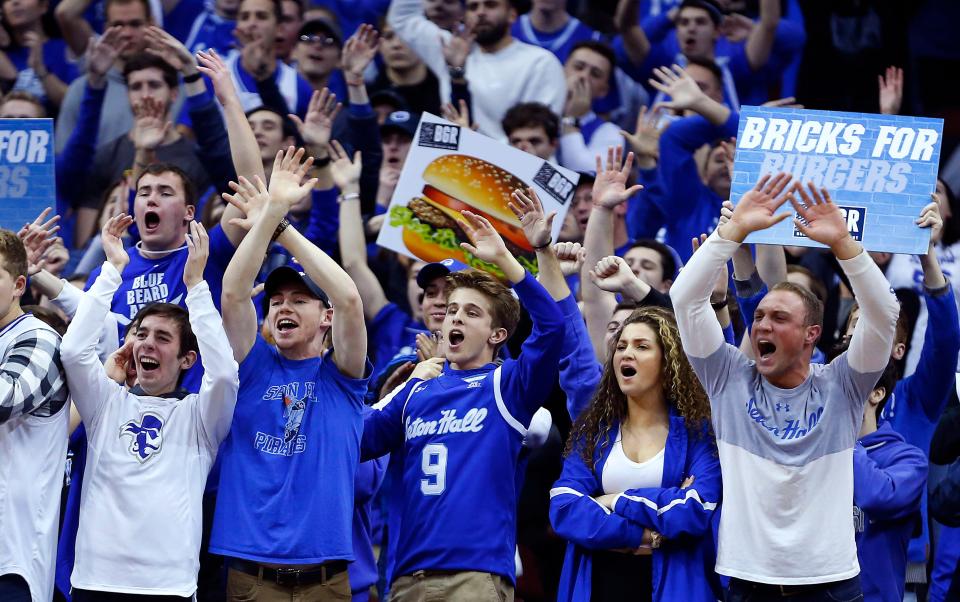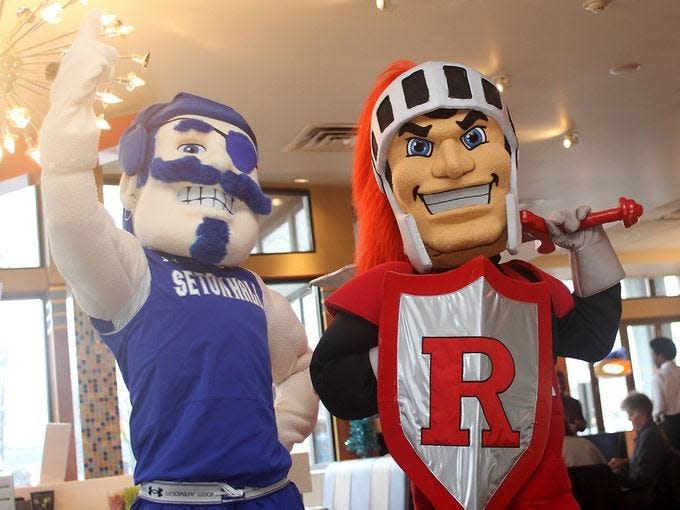How Rutgers, Seton Hall alums are addressing the NIL scene
Last summer, when college athletes first became eligible to profit off their name, image and likeness, Rutgers grad Jon Newman sought to sign an appearance deal with two prominent Scarlet Knights athletes for the podcast he co-hosts with fellow alum Danny Breslauer.
“We called over to Rutgers and they were like, ‘That’s great, but we can’t help you,’” Newman recalled. “I don’t blame them. The NCAA is giving them zero guidance and New Jersey state law limits what (university athletic departments) are able to do.”
So Newman and Breslauer hammered out their own deals with the athletes — basketball's Geo Baker and football's Isiah Pacheco. And they kept an eye on the NIL landscape.
“I started to see the emergence of these collectives at all the big schools,” Newman said, referring to alumni/fan groups formed expressly to broker NIL deals for athletes at their alma mater. “I was like, ‘Oh my God, if you do the math and you see what’s coming, Rutgers could be in trouble.’”
His vision proved prescient. NIL deals, or in some cases pay-for-play arrangements masquerading under the NIL banner, quickly have become a primary driver in football and men’s basketball recruiting and retention — especially within the burgeoning transfer market.
To help Rutgers keep pace, Newman and a group of like-minded supporters have created Knights of the Raritan — the first NIL collective for Scarlet Knights athletes and fans. With a stated goal of helping Rutgers athletes “maximize their NIL opportunities the right way, without compromising the values of the university,” It launched on Thursday.
“We’re trying to help the student-athletes be as successful as possible, and we’re trying to help Rutgers athletics be as competitive as possible,” Newman said.
A group of Seton Hall alums also is moving to address NIL opportunities but taking a somewhat different approach, working under the umbrella of a long-standing sports marketing firm helmed by an alum.
“This is urgent,” said John Colantoni, a Seton Hall grad who is involved. “It’s needed now.”

The NIL: A concept on steroids
In 2019 the NCAA formed a working group to address the NIL issue. The group sought to include “guardrails.” They never came to fruition. Pretty much the only universal rule is that the university itself cannot pay the athletes; the deals must be struck with an outside party.
Alums, boosters and fans are jumping into the void with collectives.
One of the biggest collectives is Spyre Sports, a Tennessee NIL initiative. Splashed across the front page of its website? “You can shape the future of Tennessee. You’re more than a fan; you’re Tennessee. And we win together.”
President and co-founder Hunter Baddour told The Athletic that the goal is to raise as much as $25 million annually.
Miami booster John Ruiz has become an NIL lightning rod. His collective drew national headlines after Ruiz tweeted that his company, LifeWallet, would give Kansas State basketball transfer Nijel Pack a two-year contract for $800,000 along with a car.
Reports recently surfaced that Pittsburgh wide receiver Jordan Addison had been contacted by a Southern California collective with an offer — and he wasn’t even in the transfer portal yet.
The Athletic reported in March that an unnamed five-star quarterback recruit in the Class of 2023 had inked an NIL deal with a collective that could net him more than $8 million by the end of his junior year.
These deals are dominating the college sports conversation right now. The first question many recruits and transfers are asking coaches is about the NIL.
Knights of the Raritan is entering this fray, although it projects a more measured approach.
“I’m not envisioning us being the John Ruizes of the world, nor do we want to be,” Newman said. “We want to do this the quote-unquote right way, although nobody has given guidance as to what that is.”
The NCAA is looking to crack down on Ruiz-type activity, but the governing body’s enforcement division is adrift and toothless. Left with a blank canvas, this is what Newman and his cohorts designed.

How Knights of the Raritan works
Knights of the Raritan (KTR) is helmed by an executive committee of nine Rutgers fans, most of whom are alums: Newman as president, Breslauer, Al Reicheg, Jeff Towers, Scott White, Ken Miller, Jerrold Colton, Russ Nesevich and Ryan Stryker.
There also is a volunteer advisory board of former Rutgers athletes: Ryan Hart (football), Sean DeDeyn (Wrestling), Quincy Douby (men’s basketball), Austin Johnson (men’s basketball), Caitlin Hardage (women’s volleyball), Katie Larmour (field hockey), Joe Nardella (men’s lacrosse), Brianne Reed (women’s soccer), Marc Moreau (men’s lacrosse), Will Mangan (men’s lacrosse), Bobby Brownlie (baseball) and Phil Napolitano (men’s soccer).
Baker, one of the godfathers of the NIL movement, is not on the board. Though he does not appear to be pursuing a pro basketball career, Baker is involved with several other business and media ventures. Newman said he is fully supportive of the collective.
“He didn’t have the time to devote to this, and I totally respect that,” Newman said.
An essential part of the collective is its partnership with Student Athlete Empowerment, an arm of an NIL firm run by attorney and Rutgers grad Jason Belzer. The collective side is tasked with outreach — generating funds, opportunities and publicity, plus adding members.
Belzer “is the keeper of the money and handles all solicitation, does all of the legal, all the accounting, putting the deals together and holding the student-athletes accountable,” Newman explained. “If the collective is paying them to do something, he’s the one who outlines that in a legal agreement, and holds them accountable for what they’re responsible to do.”
Rutgers athletes interested in NIL deals can reach out to KTR for assistance. Corporate sponsors or fans interested in a deal with a Rutgers athlete can do the same. The transaction must feature a “quid pro quo” between athlete and sponsor. A service has to be rendered; the sponsor can’t just donate money to an athlete for nothing in return.
“Student-athletes cannot enter into deals that promote alcohol, drugs, pharmaceuticals, political advertising, pornography, gambling or betting, or other opportunities that go against Rutgers’ values,” KTR’s website says.
As part of its launch, KTR is announcing NIL deals with five Rutgers athletes: football players Kassawn Abraham, Ireland Brown and Joshua Youngblood, men’s basketball player Paul Mulcahy and women’s soccer player Riley Tiernan.
Financial details of the deals won’t be publicized.
“I don’t think it’s fair to student-athletes, and for competitive reasons, to say how big they are,” Newman said. “We will be as transparent as we can, but there are privacy issues, as well as making sure we’re not putting Rutgers athletics at any sort of competitive disadvantage. When we have a new deal we’ll announce what they are and who they’re with, but probably nothing in terms of amounts.”
Fans who wish to join the collective can do so at various levels ranging from $10 to $500 per month, with benefits escalating accordingly. One-time contributions are accepted as well.
“We’re not relying solely on big-name donors,” Newman said. “We feel Rutgers has a large enough alumni base that there are enough people who want to get involved at various levels.”
There is no goal amount of members or funds raised. They’re going to see how it goes.
“If we can get a couple of thousand people becoming members at a $20-a-month level or thereabouts, that’s a half-million a year before we even go after larger donations,” Newman said. “And we’ve already secured some larger donors.”

For Seton Hall alums, another approach
The dynamics are different at Seton Hall, with a fraction of the alumni base and no football. That said, the NIL is an influence in high-major basketball, and Eric Liebler has experience with it.
Liebler is a two-time Hall grad who served as a manager and later a staff assistant with the men’s hoops program under Tommy Amaker. He is president of G3 Marketing, a firm that specializes in connecting athletes and fans. This past year he brokered NIL deals for Jared Rhoden and Kadary Richmond with Topps Trading Cards.
One of G3 Marketing’s specialties is coordinating camp experiences with pro athletes like Karl-Anthony Towns and Dak Prescott, among others. In Seton Hall basketball’s case, Liebler said, “we’d like to be able to fund camps free to kids in underserved communities utilizing the entire team.”
In other words, Seton Hall’s players will help run a hoops camp in Newark and get paid for it. The scope of this — how many camps there are and how much money the players could earn, potentially — depends on the financial backing.
“We’re looking for financial sponsors, corporate and individual,” Liebler said. “Ideally, there’s a mix.”
A second concept in the pipeline is hosting a “Fan Fest” type of event in the fall.
“The players would come and they would provide services with autographs and (things like) a 3-point contest, a dunk contest, and they would be compensated for that day,” Colantoni said.
In addition, Colantoni said, “I would like for these kids to be able to speak to high schools and elementary schoolsand that is part of what they are being compensated for.”
Like their counterparts at Rutgers, these Seton Hall alums want to avoid a Ruiz situation – “that’s pay-for-play, and that’s not what we want to do,” Colantoni said. Unlike the Rutgers movement, they are not a collective. Liebler is looking for grads and fans like Colantoni, who co-founded a law firm, to help sponsor these events run by G3 Marketing.
“It’s a little bit of a passion project because I went to Seton Hall and it’s nice to be able to bring some deals to the players and be able to give back to the community with a camp,” Liebler said.

Thorny issues
Both Liebler and Newman acknowledge the concerns that revolve around these enterprises.
For starters, their respective alma maters’ athletic departments cannot be involved per New Jersey law. Newman and Liebler are in communication with athletic department compliance officials to make sure they don’t get anyone in hot water, but that’s the extent of it.
Secondly, for the time being at least, they can only accommodate so many student-athletes. They have to make choices on how to allocate resources. At Seton Hall, it will start with men’s basketball.
“I like to do it with the whole team rather than picking one player,” Liebler said. “It’s fun to have the whole team there — and not create dynamics in the locker room.”
At Rutgers, Newman said, “We’ll look to spread the wealth around to the extent that we can, at the same time knowing the sports that are really going to drive this from an industry standpoint.”
A third issue: Their initiatives are, to an extent, competing with the fundraising arms of these athletic departments.
“We know historically that the Rutgers (fundraising) pie is only so big, and that we’re asking to cut another slice out of it,” Newman said.
Seton Hall is knee-deep in raising money for a $40 million basketball practice facility.
“We’re going to do our best to bring in as many partnerships as we can,” Colantoni said. “At the same time we don’t want to take away from the school’s donors.”
There’s inherent tension there, and nobody knows how it will play out. In fact, no one knows how any of this will play out. It’s uncharted waters.
For more information on Knights of the Raritan, visit https://knightsoftheraritan.com.
For more information on G3 Marketing’s Seton Hall NIL initiative, email Eric Liebler at Eliebler@G3marketing.com.
Jerry Carino has covered the New Jersey sports scene since 1996 and the college basketball beat since 2003. He is an Associated Press Top 25 voter. Contact him at jcarino@gannettnj.com.
This article originally appeared on Asbury Park Press: How Rutgers, Seton Hall alums are addressing the NIL scene

